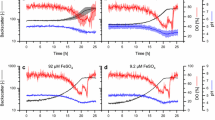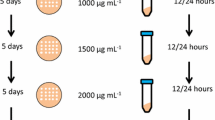Abstract
Clone screening procedures for Pichia pastoris expression strain comparison rely on the availability of a cultivation environment that ensures equal growth and production capabilities for all assessed transformants. As clonal variation in such experiments is caused by diverging numbers and possibly also genomic locations of integrated (linearized) expression constructs, the productivity assessment of a larger number of strains is mandatory for selecting a set of strains for follow-up bioreactor cultivations in order to define the best-producing clone. Microscale cultivation provides the means to reliably compare growth and productivity of a large number of transformants and by that narrows down the amount of selected strains for scaling up.
Access this chapter
Tax calculation will be finalised at checkout
Purchases are for personal use only
Similar content being viewed by others
References
Weinhandl K, Winkler M, Glieder A, Camattari A (2014) Carbon source dependent promoters in yeasts. Microb Cell Factories 13:5. https://doi.org/10.1186/1475-2859-13-5
Hartner FS, Ruth C, Langenegger D, Johnson SN, Hyka P, Lin-Cereghino GP, Lin-Cereghino J, Kovar K, Cregg JM, Glieder A (2008) Promoter library designed for fine-tuned gene expression in Pichia pastoris. Nucleic Acids Res 36(12):e76. https://doi.org/10.1093/nar/gkn369
Prielhofer R, Maurer M, Klein J, Wenger J, Kiziak C, Gasser B, Mattanovich D (2013) Induction without methanol: novel regulated promoters enable high level expression in Pichia pastoris. Microb Cell Factories 12:5. https://doi.org/10.1186/1475-2859-12-5
Marsalek L, Gruber C, Altmann F, Aleschko M, Mattanovich D, Gasser B, Puxbaum V (2017) Disruption of genes involved in CORVET complex leads to enhanced secretion of heterologous carboxylesterase only in protease deficient Pichia pastoris. Biotechnol J 12(5). https://doi.org/10.1002/biot.201600584
Weis R, Luiten R, Skranc W, Schwab H, Wubbolts M, Glieder A (2004) Reliable high-throughput screening with Pichia pastoris by limiting yeast cell death phenomena. FEMS Yeast Res 5:179–189. https://doi.org/10.1016/j.femsyr.2004.06.016
Lin-Cereghino J, Wong WW, Xiong S, Giang W, Luong LT, Vu J, Johnson SD, Lin-Cereghino GP (2005) Condensed protocol for competent cell preparation and transformation of the methylotrophic yeast Pichia pastoris. BioTechniques 38(1):44–48
Ahmad M, Hirz M, Pichler H, Schwab H (2014) Protein expression in Pichia pastoris: recent achievements and perspectives for heterologous protein production. Appl Microbiol Biotechnol 98:5301–5317. https://doi.org/10.1007/s00253-014-5732-5
Camattari A, Goh A, Yee Yip L, Hee Meng Tan A, Wai Ng S, Tran A, Liu G, Liachko I, Dunham MJ, Rancati G (2016) Characterization of a panARS-based episomal vector in the methylotrophic yeast Pichia pastoris for recombinant protein production and synthetic biology applications. Microb Cell Factories 15:139. https://doi.org/10.1186/s12934-016-0540-5
Sunga AJ, Tolstorukov I, Cregg JM (2008) Posttransformational vector amplification in the yeast Pichia pastoris. FEMS Yeast Res 8:870–876. https://doi.org/10.1111/j.1567-1364.2008.00410.x
Aw R, Polizzi KM (2013) Can too many copies spoil the broth? Microb Cell Factories 12:128. https://doi.org/10.1186/1475-2859-12-128
Marx H, Mecklenbräuer A, Gasser B, Sauer M, Mattanovich D (2009) Directed gene copy number amplification in Pichia pastoris by vector integration into the ribosomal DNA locus. FEMS Yeast Res 9:1260–1270. https://doi.org/10.1111/j1567-1364.2009.00561.x
Zhu T, Guo M, Sun C, Qian J, Zhuang Y, Chu J, Zhang S (2009) A systematical investigation on the genetic stability of multi-copy Pichia pastoris strains. Biotechnol Lett 31:679–684. https://doi.org/10.1007/s10529-009-9917-4
Author information
Authors and Affiliations
Corresponding author
Editor information
Editors and Affiliations
Rights and permissions
Copyright information
© 2019 Springer Science+Business Media, LLC, part of Springer Nature
About this protocol
Cite this protocol
Weis, R. (2019). High-Throughput Screening and Selection of Pichia pastoris Strains. In: Gasser, B., Mattanovich, D. (eds) Recombinant Protein Production in Yeast. Methods in Molecular Biology, vol 1923. Humana Press, New York, NY. https://doi.org/10.1007/978-1-4939-9024-5_7
Download citation
DOI: https://doi.org/10.1007/978-1-4939-9024-5_7
Published:
Publisher Name: Humana Press, New York, NY
Print ISBN: 978-1-4939-9023-8
Online ISBN: 978-1-4939-9024-5
eBook Packages: Springer Protocols




